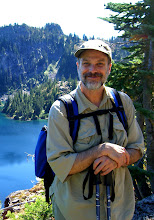
Sometimes, when I’m dissatisfied, I catch a glimpse of the fact that it’s because I’m struggling with the way things are.
The value of that glimpse is the chance to wake up from the nightmare of being separate from what I experience -- the frustration of trying to control or escape an experience I can’t abide.
It’s easy to idealize the awakening, but I have to admit that ideal doesn’t mean or do much for me when I’m not suffering, or when I’m not willing to be free. It’s the awareness of suffering that makes the possibility of waking up meaningful, and it’s the willingness to be free that makes the possibility come true.
Abiding in experience (shamatha) is a definite first step towards seeing the nature of things (vipashyana). Responding well to what is seen (compassion) is the point.
Every religion seems to have its versions of escaping reality and grasping after an Ultimate. (Mental or typographical capital letters is one sign of trying to grasp The Sacred Ultimate. Freezing and thinking upon encountering discomfort is one sign of trying to escape reality). Buddhists and christians have different notions and languages to explain their versions, but it seems to be the same problem: confused grasping.
Christians might elevate God to a place so far above human experience that they have to rely on priestly intercession and wistful hopes for an eventually Perfect Afterlife. Buddhists might elevate states of clarity and power into fantasies of a Permanent Happy Self. (Rather ironic, that fantasy, since insight is supposed to see that no thing is permanent, ultimately satisfying, or separate).
Religious institutions are built from the elevation of an Ultimate over the relative. Mystics, whether christian or buddhist, are often considered (by institutional defenders) to be heretics for insisting on our inherent ability to bring the ultimate right into the relative world. Free and happy people are not much use to institutions promising eventual access to Paradise (aka Enlightenment) while trying to (or in order to) control the relative world.
For me, the point of spiritual practice is to keep working and playing the relative and ultimate until they are inseparable. Until I really know, and live from the knowing, that it's folly to try to separate myself from my experience so I can grasp a Fantasy.
Well, while I'm here I'll
do the work --
and what's the work?
To ease the pain of living.
Everything else, drunken
dumbshow.
~ Allen Ginsberg, Memory Gardens
The paramitas, taking and sending, the compassionate embracing of my own and others’ foibles -- all of these bring me back to the real (the relative) and away from the fantasy of an ultimate experience (usually, depending on the day’s proclivities, some version of calm, clarity, bliss, or power).
Even the practice of insight into emptiness, properly cultivated, doesn’t degenerate into trying to experience Ultimate Emptiness. There is no such Thing as Emptiness (click here for a blog post on that can of worms).
Every thing (experience) is simply empty of being a Permanent Happy Self -- and, at the same time, and just as important -- every thing (experience) is still a thing (experience) to be dealt with. The more I struggle with something, the more in my face it seems to get -- and that gets me embroiled in drama. But if I tell myself something isn’t real, I fall out of touch with what’s happening -- and that can get me killed.
The worldly mistake is naively believing everything I see and feel and think: someone looks or sounds to me like a jerk so I react accordingly. The religious mistake is condemning the relative and elevating some Ultimate: I so love calm, bliss, and clarity that I try to make them permanent states. Both mistakes exacerbate the split that results in suffering.
Whenever I start to idealize (idolize) a particular experience or idea, I’ve fallen into the ultimate trap. Whenever I grasp after or despair of ordinary experience, I’ve fallen into the relative trap. The only ultimate is that everything is relative. A statue is just a chunk of wood, and a person is just an animal, but bowing before them can humble my mind, open my heart, and raise my spirit.
A buddha is someone who’s awake -- awake in experience arising: the gritty, wild sensations, feelings, thoughts, and actions of this world. When I’m awake, knowing what experience is and isn’t, I don’t cling to sad delusions of controlling experience or escaping the world. I don’t want to escape -- this is the pure land. How long does that last? Until I start clinging to something.
Ajahn Chah used to ask meditators if they were suffering. If the answer was “No,” the ajahn would say “Great!” and that was that. If the answer was “Yes,” he’d ask, “What are you clinging to?”
Ultimately, it’s all relative. May all beings be happy, healthy, at ease in their body, at home in the world.

